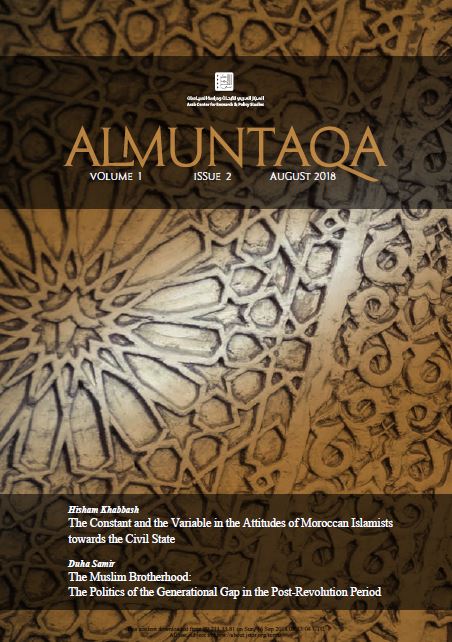
The Arab Center for Research and Policy Studies is pleased to announce the publication of the second issue of AlMuntaqa, its first peer-reviewed English-language journal dedicated to the social sciences and humanities. The publication of the second issue of AlMuntaqa continues the efforts to provide access to the Arab Center's Arabic language materials as well as its wide ranging existing network of Arab social scientists. Carrying on with this mission means consistently choosing articles and reviews based on valuable fieldwork, rich data, and primary materials that are difficult for English-language researchers or readers to access. Not only this, but AlMuntaqa provides access to interdisciplinary work, as the articles in this issue tackle topics using various political, sociological, historical, and even etymological and philosophical approaches.
In the first article, "The Constant and the Variable in the Attitudes of Moroccan Islamists Regarding the Civil State," Hicham Khabbash utilizes an original survey of members of Morocco's two main Islamist parties (the Justice and Charity Movement and the Justice and Development Party) to examine their views regarding the modern secular state and to understand the extent to which these views have changed due to their direct experience with governance.
In the second article, "The Muslim Brotherhood: The Politics of the Generational Gap in the Post-Revolution Period," Duha Samir delves into the generational differences between members of the Muslim Brotherhood using a definition of generations as "different currents of intellectual thought," and not strictly categorized by age. The author uses focused or semi-structured interviews with current and former members of the movement as well as selected biographies, Facebook groups, and video recordings by the members.
In the third article "Ta'ifah, Sect and Sectarianism: From The Etymology of the Term and its Variable Implications to an Analytical Sociological Term," Azmi Bishara elaborates on the fundamental conceptual idiomatic distinctions between community according to religious or confessional affiliation (at-tai'fah), sectarianism (at-ta'ifiyyah) and confessionalism (al-madhabiyyah) – concepts and phenomena that are deeply intertwined. He also explores related concepts such as identity, religious affiliation, sect, difference, fanaticism (taasub), and others. Through a critical debate with the modern Western sociological concepts of sectarianism (al-ta'ifiyyah or al-firqiyyah), the study attempts to develop the term "sect" as an analytical sociological term that can be used to analyze the formation, evolution, and characteristics of new contemporary imagined communities, according to religious communities that the author calls
"imagined sects."
Concluding the studies, Hayat Amamu's paper "The Nature of Early Islamic Sources and the Debate Over their Historical Significance" examines the debate over the foundational Arabic/ Islamic texts in the early history of Islam and the first Muslims. Amamu surveys this debate between scholars and seeks to resolve it by examining the various methodological approaches adopted by historians towards the texts of early Islamic history beginning in the nineteenth century: the descriptive, critical, skeptical approaches, in addition to a school of thought which relies entirely on foreign language sources—particularly Syriac/Aramaic and (archaic) Greek sources.
In this issue's Arab Opinion Index article "Religiosity and its Political Effects," Dana El Kurd attempts to understand the effect of religiosity on public opinion? Using the Arab Opinion Index's 2016 data to examine the effect of individual religiosity on public opinion and political behavior, she challenges the slew of studies that proliferated after the events of 11 September 2001, which arbitrarily linked religiosity in the Arab world and negative feelings towards democracy.
Finally, this issue will feature two critical book discussions and one book review. Dina Khoury compares and contrasts two foundational sociological historians in Iraqi history: Hanna Batatu and Ali Al-Wardi. Walid Noueihed examines four books on the Syrian Revolution released by the ACRPS which are: Azmi Bishara's book Syria's Via Dolorosa to Freedom: An Attempt at Contemporary History, Mohammed Jamal Barout's The Last Decade in the History of Syria, Hamza Mustafa's The Virtual Public Sphere in the Syrian Revolution and an edited volume titled Backgrounds to the Revolution. Finally, Azzam Amin reviews the book The Arab Intellectual and the Tiananmen Square Syndrome by Amro Othman and Mrouwa Fikry which was released by ACRPS in 2016.
AlMuntaqa is a free access journal courtesy of the Arab Center and it's available on  https://www.jstor.org/journal/almuntaqa .
https://www.jstor.org/journal/almuntaqa .